20XX新编大学英语3课后习题答案
新编大学英语综合教程3第三版部分课后答案
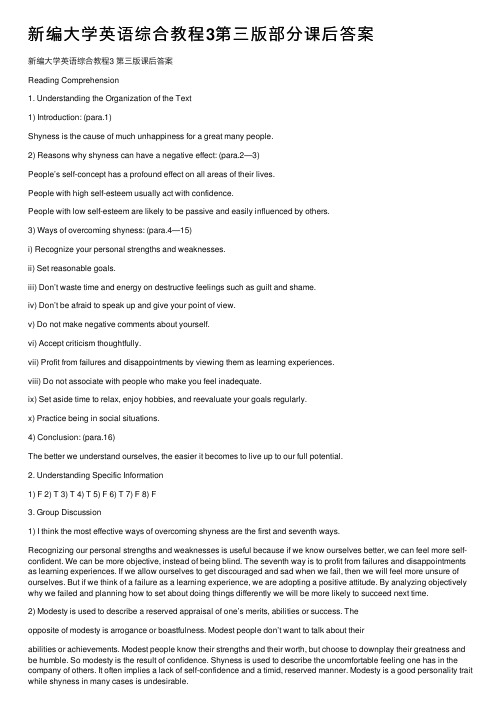
新编⼤学英语综合教程3第三版部分课后答案新编⼤学英语综合教程3 第三版课后答案Reading Comprehension1. Understanding the Organization of the Text1) Introduction: (para.1)Shyness is the cause of much unhappiness for a great many people.2) Reasons why shyness can have a negative effect: (para.2—3)People’s self-concept has a profound effect on all areas of their lives.People with high self-esteem usually act with confidence.People with low self-esteem are likely to be passive and easily influenced by others.3) Ways of overcoming shyness: (para.4—15)i) Recognize your personal strengths and weaknesses.ii) Set reasonable goals.iii) Don’t waste time and energy on destructive feelings such as guilt and shame.iv) Don’t be afraid to speak up and give your point of view.v) Do not make negative comments about yourself.vi) Accept criticism thoughtfully.vii) Profit from failures and disappointments by viewing them as learning experiences.viii) Do not associate with people who make you feel inadequate.ix) Set aside time to relax, enjoy hobbies, and reevaluate your goals regularly.x) Practice being in social situations.4) Conclusion: (para.16)The better we understand ourselves, the easier it becomes to live up to our full potential.2. Understanding Specific Information1) F 2) T 3) T 4) T 5) F 6) T 7) F 8) F3. Group Discussion1) I think the most effective ways of overcoming shyness are the first and seventh ways.Recognizing our personal strengths and weaknesses is useful because if we know ourselves better, we can feel more self-confident. We can be more objective, instead of being blind. The seventh way is to profit from failures and disappointments as learning experiences. If we allow ourselves to get discouraged and sad when we fail, then we will feel more unsure of ourselves. But if we think of a failure as a learning experience, we are adopting a positive attitude. By analyzing objectively why we failed and planning how to set about doing things differently we will be more likely to succeed next time.2) Modesty is used to describe a reserved appraisal of one’s merits, abilities or success. Theopposite of modesty is arrogance or boastfulness. Modest people don’t want to talk about theirabilities or achievements. Modest people know their strengths and their worth, but choose to downplay their greatness and be humble. So modesty is the result of confidence. Shyness is used to describe the uncomfortable feeling one has in the company of others. It often implies a lack of self-confidence and a timid, reserved manner. Modesty is a good personality trait while shyness in many cases is undesirable.3) B eing shy isn’t necessarily a bad thing. It is appropriate and normal to be shy in some circumstances, for example, in the presence of teachers, your boss, your parents’ friends or your prospective in-laws; when you are dating someone, especially the first time; when you are with stranger s; when you are in a new environment; when you’re facing a large audience. In fact, it can even be helpful to be a little shy. When you’re shy and keep silent, you may spend a little time observing the surroundings and people around before jumping right into the new situation.Vocabulary1. “Self-”is a prefix which means “of, to or by oneself or itself” .Words with the prefix “self-” that appear in the text: self-conscious, self-concept, self-assurance, self-worth, self-confidence, self-esteem, self-destructive, self-awareness, self-acceptance, self-rejection, self-confident.1) self-conscious (worried and embarrassed about what you look like or what other people think of you)2) self-confidence (belief in one’s own ability, power, judgment, etc.; confidence in oneself)3) self-esteem (the feeling that you are someone who deserves to be liked, respected, or admired)4) self-destructive (with thoughts or actions that are counter to one’s own best interests)5) self-worth (the value you give to your life and achievements)6) self-concept (one’s conception or general idea of one’s own basic character and nature)7) self-awareness (realistic knowledge and judgment about oneself)8) self-assurance/self-confidence (the belief that you are able to deal with people and problems easily)2. Part A1) G 2) I 3) A 4) F 5) C 6) D 7) J 8) B 9) E 10) HPart B1) profound 2) jealousy 3) overcome 4) eventually 5) compliments6) diminish 7) reassurance 8) detrimental 9) isolated 10) accented3. 1) reflected 2) concerned/worried 3) profound effect/influence 4) viewed/regarded 5) sensitive 6) respond/react 7) eliminated 8) overcome my fear 9) concentrate on 10) made no commentTranslation1. Shyness can vary from feeling mild discomfort to high levels of anxiety that impact us in almosteverything we do.2. Despite his stubbornness, he knew in his heart that he should avoid arousing any suspicions.3. It will be interpreted as criticism no matter what you say.4. Let’s not allow ourselves to be upset by trifles (which) we should despise and forget.5. Too much time spent dwelling on the past can get in the way of enjoying life as it happens.6. People who believe they can accomplish goals and solve problems are more likely to do well inschool.Further Development1. Enriching Your Word Power1) B 2) B 3) A 4) B 5) C 6) C 7) C 8) A 9) A 10) C哈哈,等我再上传啦。
新编大学英语3课后翻译题答案
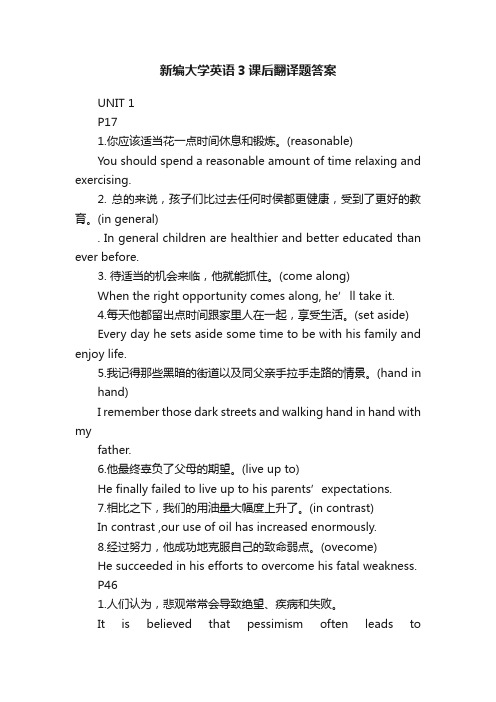
新编大学英语3课后翻译题答案UNIT 1P171.你应该适当花一点时间休息和锻炼。
(reasonable)You should spend a reasonable amount of time relaxing and exercising.2. 总的来说,孩子们比过去任何时侯都更健康,受到了更好的教育。
(in general). In general children are healthier and better educated than ever before.3. 待适当的机会来临,他就能抓住。
(come along)When the right opportunity comes along, he’ll take it.4.每天他都留出点时间跟家里人在一起,享受生活。
(set aside)Every day he sets aside some time to be with his family and enjoy life.5.我记得那些黑暗的街道以及同父亲手拉手走路的情景。
(hand inhand)I remember those dark streets and walking hand in hand with myfather.6.他最终辜负了父母的期望。
(live up to)He finally failed to live up to his parents’expectations.7.相比之下,我们的用油量大幅度上升了。
(in contrast)In contrast ,our use of oil has increased enormously.8.经过努力,他成功地克服自己的致命弱点。
(ovecome)He succeeded in his efforts to overcome his fatal weakness.P461.人们认为,悲观常常会导致绝望、疾病和失败。
新编大学英语综合教程3课后答案
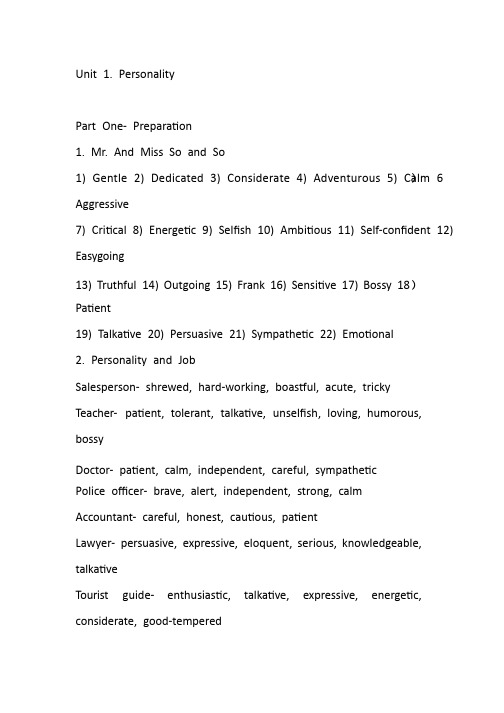
Part One- Prepara on 1. Mr. And Miss So and So 1) Gentle 2) Dedicated 3) Considerate 4) Adventurous 5) C)alm 6 Aggressive 7) Cri cal 8) Energe c 9) Selfish 10) Ambi ous 11) Self-confident 12) Easygoing 13) Truthful 14) Outgoing 15) Frank 16) Sensi ve 17) Bossy 18) Pa ent 19) Talka ve 20) Persuasive 21) Sympathe c 22) Emo onal 2. Personality and Job Salesperson- shrewed, hard-working, boas ul, acute, tricky Teacher- pa ent, tolerant, talka ve, unselfish, loving, humorous, bossy
4) Think about your strengths and build up self-confidence in front of problems or difficul es. 5) Don’t let nega ve thoughts hold you back. 6)Everyone has experienced failures anddi sappointments, so don’t blame yourself too much.
iv) Don’t be afraid to speak up and give your point of view. v) Do not make nega ve comments about yourself. vi) Accept cri cism thoughfully. vii) Profit from failures and disappointments by viewing them as learning experiences. viii) Do not associate with people who make you feel inadequate. ix) Set aside me to relax, enjoy hobbies, and reevaluate your goals regularly. x) Prac ce being in social situa ons. 4) Conclusion: (para16) The be er we understand ourselves, the easier it becomes to live up to our full poten al. 2. Understanding Specific Informa on 1) F 2) T 3) T 4) T 5) F 6)T 7)F 8)F 9)T Vocabulary
(新编大学英语三课后习题答案汇总)BOOK3书上英语答案
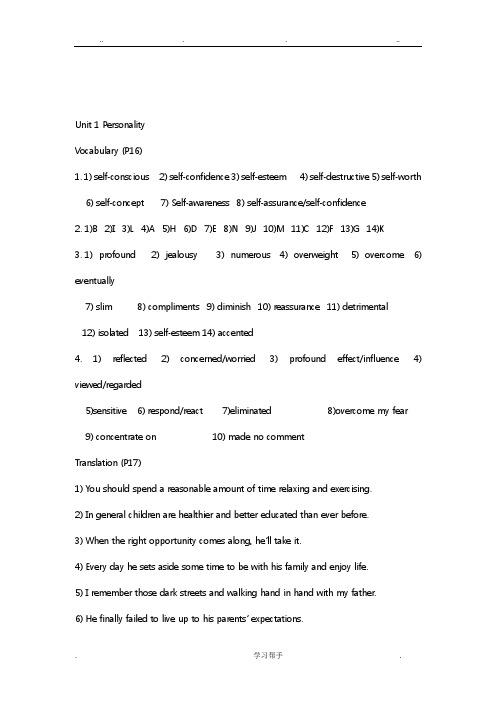
Unit 1 PersonalityVocabulary (P16)1. 1) self-conscious 2) self-confidence 3) self-esteem 4) self-destructive 5) self-worth 6) self-concept 7) Self-awareness 8) self-assurance/self-confidence2. 1)B 2)I 3)L 4)A 5)H 6)D 7)E 8)N 9)J 10)M 11)C 12)F 13)G 14)K3. 1) profound 2) jealousy 3) numerous 4) overweight 5) overcome 6) eventually7) slim 8) compliments 9) diminish 10) reassurance 11) detrimental12) isolated 13) self-esteem 14) accented4. 1) reflected 2) concerned/worried 3) profound effect/influence 4) viewed/regarded5)sensitive 6) respond/react 7)eliminated 8)overcome my fear 9) concentrate on 10) made no commentTranslation (P17)1) You should spend a reasonable amount of time relaxing and exercising.2) In general children are healthier and better educated than ever before.3) When the right opportunity comes along, he’ll take it.4) Every day he sets aside some time to be with his family and enjoy life.5) I remember those dark streets and walking hand in hand with my father.6) He finally failed to live up to his parents’ expectations.7) In contrast, our use of oil has increased enormously.8) He succeeded in his efforts to overcome his fatal weakness.Part Four Writing and Translation (P46)2. Translation Practice1) It is believed that pessimism often leads to hopelessness, sickness and failure.2) Optimism, by contrast, can make you happy, healthy and successful.3) When you fail in something, profit from the failure as a learning experience.4) Think about your strengths and build up self-confidence in front of problems or difficulties.5) Don’t let negative thoughts hold you back.6) Everyone has experienced failures and disappointments, so don’t blame yourself too much.Unit 2 Myths and LegendsVocabulary (P62)1. 1) A. invitation B. invited C. inviting 2) A. prepare B. prepared C. preparation D. preparatory/preparation3) A. discoveries B. discoverers C. discovered4) A. approval B. approve C. approved D. approving E. disapprove5) A. eloquent B. eloquence C. eloquently6) A. faithful B. unfaithful/faithless C. faith d. faithfully7) A. occasional B. occasionally C. occasion8) A. delivery B. delivering C. delivered9) A. troublesome B. troubled C. troubled D. troubling10) A. assurance B. assured C. assure2. 1) got/ran into trouble 2) no trouble 3) asking for trouble 4) have … trouble 5) trouble with6) in serious/deep/big trouble 7) get/getting … into trouble8) took the trouble 3. 1) with a pattern of roses 2) prepared a wonderful/goof meal for us 3) promised faithfully 4) deliver this letter5) a selection of milk and plain chocolate 6) keep out of mischief/behave themselves 7) the sound of distant thunder 8) received approval from the government 9) in spite of the fact that he drank too much 10) agree whether the drug is safe or not Part Three Further Development5. Complete the following Ancient Chinese story by translating the Chinese into English(P93)1) the true reason why there was no such animal in Guizhou2) they were of no use at all in this place3) when he saw the donkey all of a sudden, he thought it was a monster4) he hid himself in the trees while looking at the donkey5) what kind of animal is this and why does it look different from other animals that I’ve seen?6) But one day the donkey stretched its thin neck and cried7) the tiger discovered that the donkey didn’t have any other skills besides crying8) But he dared not rush to it and eat it just as he did to other animals9) This did irritate the donkey (made the donkey angry), who raised its hind leg and kicked the tiger10) This time he rushed to it without hesitation and bit its rhroatPart Four Writing and Translation2. Translation Practice(P96)万物之初,天地还是一体,充满混沌。
(新编大学英语三课后习题答案汇总)BOOK3书上英语答案
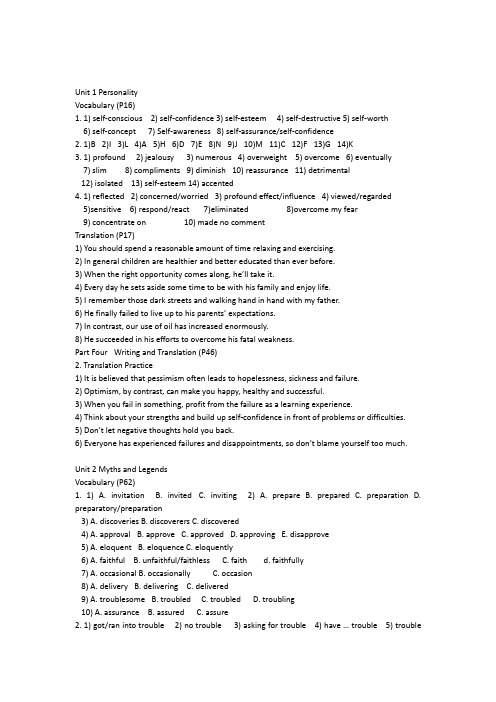
Unit 1 PersonalityVocabulary (P16)1. 1) self-conscious 2) self-confidence 3) self-esteem 4) self-destructive 5) self-worth6) self-concept 7) Self-awareness 8) self-assurance/self-confidence2. 1)B 2)I 3)L 4)A 5)H 6)D 7)E 8)N 9)J 10)M 11)C 12)F 13)G 14)K3. 1) profound 2) jealousy 3) numerous 4) overweight 5) overcome 6) eventually7) slim 8) compliments 9) diminish 10) reassurance 11) detrimental12) isolated 13) self-esteem 14) accented4. 1) reflected 2) concerned/worried 3) profound effect/influence 4) viewed/regarded5)sensitive 6) respond/react 7)eliminated 8)overcome my fear9) concentrate on 10) made no commentTranslation (P17)1) You should spend a reasonable amount of time relaxing and exercising.2) In general children are healthier and better educated than ever before.3) When the right opportunity comes along, he’ll take it.4) Every day he sets aside some time to be with his family and enjoy life.5) I remember those dark streets and walking hand in hand with my father.6) He finally failed to live up to his parents’ expectations.7) In contrast, our use of oil has increased enormously.8) He succeeded in his efforts to overcome his fatal weakness.Part Four Writing and Translation (P46)2. Translation Practice1) It is believed that pessimism often leads to hopelessness, sickness and failure.2) Optimism, by contrast, can make you happy, healthy and successful.3) When you fail in something, profit from the failure as a learning experience.4) Think about your strengths and build up self-confidence in front of problems or difficulties.5) Don’t let negative thoughts hold you back.6) Everyone has experienced failures and disappointments, so don’t blame yourself too much.Unit 2 Myths and LegendsVocabulary (P62)1. 1) A. invitation B. invited C. inviting 2) A. prepare B. prepared C. preparation D. preparatory/preparation3) A. discoveries B. discoverers C. discovered4) A. approval B. approve C. approved D. approving E. disapprove5) A. eloquent B. eloquence C. eloquently6) A. faithful B. unfaithful/faithless C. faith d. faithfully7) A. occasional B. occasionally C. occasion8) A. delivery B. delivering C. delivered9) A. troublesome B. troubled C. troubled D. troubling10) A. assurance B. assured C. assure2. 1) got/ran into trouble 2) no trouble 3) asking for trouble 4) have … trouble5) troublewith6) in serious/deep/big trouble 7) get/getting … into trouble8) took the trouble3. 1) with a pattern of roses 2) prepared a wonderful/goof meal for us3) promised faithfully 4) deliver this letter5) a selection of milk and plain chocolate 6) keep out of mischief/behave themselves7) the sound of distant thunder 8) received approval from the government9) in spite of the fact that he drank too much 10) agree whether the drug is safe or notPart Three Further Development5. Complete the following Ancient Chinese story by translating the Chinese into English(P93)1) the true reason why there was no such animal in Guizhou2) they were of no use at all in this place3) when he saw the donkey all of a sudden, he thought it was a monster4) he hid himself in the trees while looking at the donkey5) what kind of animal is this and why does it look different from other animals that I’ve seen?6) But one day the donkey stretched its thin neck and cried7) the tiger discovered that the donkey didn’t have any other skills besides crying8) But he dared not rush to it and eat it just as he did to other animals9) This did irritate the donkey (made the donkey angry), who raised its hind leg and kicked the tiger10) This time he rushed to it without hesitation and bit its rhroatPart Four Writing and Translation2. Translation Practice(P96)万物之初,天地还是一体,充满混沌。
新编大学英语3课后答案
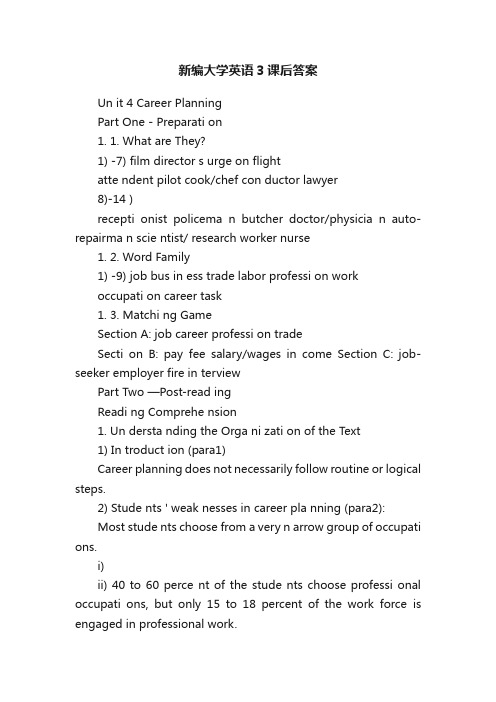
新编大学英语3课后答案Un it 4 Career PlanningPart One - Preparati on1. 1. What are They?1) -7) film director s urge on flightatte ndent pilot cook/chef con ductor lawyer8)-14 )recepti onist policema n butcher doctor/physicia n auto-repairma n scie ntist/ research worker nurse1. 2. Word Family1) -9) job bus in ess trade labor professi on workoccupati on career task1. 3. Matchi ng GameSection A: job career professi on tradeSecti on B: pay fee salary/wages in come Section C: job-seeker employer fire in terviewPart Two —Post-read ingReadi ng Comprehe nsion1. Un dersta nding the Orga ni zati on of the Text1) In troduct ion (para1)Career planning does not necessarily follow routine or logical steps.2) Stude nts ' weak nesses in career pla nning (para2):Most stude nts choose from a very n arrow group of occupati ons.i)ii) 40 to 60 perce nt of the stude nts choose professi onal occupati ons, but only 15 to 18 percent of the work force is engaged in professional work.iii) Young men lack in terest i n fields that offer many job opport un ities.iv) A third of the stude nts are un able to express any choice of occupati on.3) Serious flaws in the ways of decisi on maki ng (para 3-5)i) Complace ny —ig noring challe nging in formati onii) Defen sive avoida nee -resort ing to wishful thi nki ng or daydream ingiii) Hypervigila nee - search ing fran tically for career possibilities and seiz ing on hastily inven ted soluti ons.4) Keys to career pla nning (para 6-11)i) Study yourself.ii) Write your career goals dow n.iii) Review your pla ns and progress periodically with ano ther pers on.iv) If you choose a career that does not fit you, you can start over.5) Chan ges in careers (para 12-13)i) Few cha nges in volve dow nward moveme nt; most i nvolve gett ing ahead. ii) Job changes and career shifts occur at all ages.6) Con clusi on (para 14-15)Although there is no sure way to make career pla ns work out, there are things that you can do now to shape your career possibilities.1. Un dersta nding Specific In formati on1)-12) T T F T F T T T T F T FVocabulary1.1)-7):acceptable efficiency implications instability rationalizeevaluation foreseeable8)-14):invention hastily probability professional challenging defensive personality 2.1)-5): in case Every so often resort to talk over start over6)-10): in reality at stake seized on leading to take stock of3.1)-6):programs way technical both provided who7)-12): such needed opportunities when toCompletion13)-18): holding early hire promote upeducatingTranslation1) He underwent a major heart surgery several years ago.2) We estimated that it would take a week to finish the work.3) I used to enjoy photography, but now I have no time to pursue any hobbies.4) You may love some one but not n ecessarily have to marry him.5) Terrorists resort to viole nee to achieve their political aims.6) He says he ' II stay in the office this after noon in case you want to see him.7) Scien tists have ide ntified the gene that causes abno rmal growth.8) These examples dem on strate how badly some stude nts write their resumes.Part Three --- Further Developme nt1. 1. En richi ng Your Word Power1) -10): A B C C C A C B B CPart Four — Tran slati on and Writi ng1. translation (略)2. Writing (sample)Jan uary,27, 2007LuD ongUni versityP. O. Box ****Dear Sir or Madam,I would like to be con sidered as an applica nt for the secretary positi on listed in today 'Yantai Daily.I am a female stude nt and I am now 21. In June this I will graduate from Lu DongUniversity. My major is economics. During my summer vacation last year, I worked as a typist in a compa ny. I can type at a speed of 80 words per minute and I have take nshortha nd. In my spare time, I have also worked on computer and now I can use the computer for word process ing.Apart from these skills, I have high proficie ncy in En glish and I can speak English fluently. I have passed CET 4 and 6 with high marks. In a word, I ' m sure that I ' m a suitable person for the job and I can do it well.I would be glad to come for an in terview at your convenience. My teleph one nu mber is *******. I am look ing forward to heari ng from you.Sincerely Yours,Un it 5 Lan guagePart One - Preparati onPart Two —Post-read ingReadi ng Comprehe nsion1. Un dersta nding the Orga ni zati on of the Text1) In troduct ion: the most importa nt day in her life. (para. 1)2) Her feelings before her teacher arrived/ her education began. (para. 2-3)3) The first encoun ter with the teacher. (para. 4)4) How she discovered words (para 5_9)A. Her in itial success in lear ning (para. 5): she lear ned the spell ing of a few words.B. The difficulties encoun tered in lear ning the mea nings of words and her reacti on.(para.6)C. Her new in sight: everyth ing had a n ame and each n ame gave birth to a new thought. (para.7-8)D. Her feelings and her new outlook on life before she fell asleep that night after her trip to the well-house. (para.9)1. Un dersta nding in Details1) A. The two lives she led before and after the teacher came.B. The day whe n her teacher came to her.C. Before the teacher came, she lived in a still, dark world in which there was no strong sen time nt or tendern ess, From that day on, she bega n to lear n Ian guage and gain a new in sight into life.2) Because the day marked a turning point in her life. On that day, the teacher came to her to reveal all things to her, i ncludi ng love. 3) A. Here being shut in the“ white darkness” refers to a feeling of being lost, like a ship atsea almost in capable of find her way in a white fog without sunshine. Hele n Keller compares herself to a ship lost in thick fog, and is un able to find her way. Like the ship with her plummet and soundin g-li ne, she is reach ing out and crying wordlessly for light in the dark unknown world. B. The ship.4) She felt tense and anxious, waiting for something to happen with beating heart. 5) Both the new doll and the big rag doll. 6) The words and the real objects7) Words are the n ames of thin gs. / Everyth ing has a n ame.8) It sudde nly daw ned on Hele n that the word thing flow ing over her hand and the word itself became alive. 9)Because the word experieneed a great change in Helen' s mind after she discovered' s rod, which had been a piece of demst wh o d, flowers with God' s love.err “dwa t ee wonotefful coolthe mystery of words, just as AaronHelen Keller ' s Feelingsshe stood on the porch, waiting for the teacher to come expectant1. How I Discovered WordsMiss Sullivan spelled doll ” in her hand interested she finally succeeded in making the letters for dollpleasant and proud the teacher tried time and again to teach her the connection between words and things impatient she felt the fragments of the broken doll at her feet delighted keenly she knew she was going out into the warm sunshine /happy pleasantshe finally discovered the mystery of launguage in the well-house excited,eager to learn she tried vainly to put the broken doll together sad repentant andshe lay in crib at the close of the day joyful and hopefulVocabulary 1. Section A 1)-10): A B A B C B C C A A SectionB 1)-5): renewed apply persist succeeded drop 6)-10): revealed wonder keenly vainly impressed 2. 1)-4): unconsciously expectant eventful immeasurable 5)-8): imitation/ imitating continually tenderness impatientWhe n …dumb,。
新编大学英语第三册课文翻译课后习题答案after_class_reading翻译1.doc
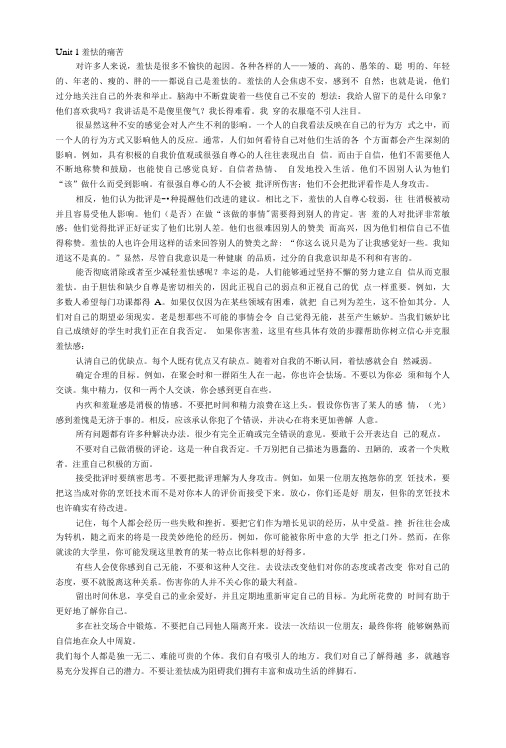
Unit 1羞怯的痛苦对许多人来说,羞怯是很多不愉快的起因。
各种各样的人——矮的、高的、愚笨的、聪明的、年轻的、年老的、瘦的、胖的——都说自己是羞怯的。
羞怯的人会焦虑不安,感到不自然;也就是说,他们过分地关注自己的外表和举止。
脑海中不断盘旋着一些使自己不安的想法:我给人留下的是什么印象?他们喜欢我吗?我讲话是不是傻里傻气?我长得难看。
我穿的衣服毫不引人注目。
很显然这种不安的感觉会对人产生不利的影响。
一个人的自我看法反映在自己的行为方式之中,而一个人的行为方式又影响他人的反应。
通常,人们如何看待自己对他们生活的各个方面都会产生深刻的影响。
例如,具有积极的自我价值观或很强自尊心的人往往表现出自信。
而由于自信,他们不需要他人不断地称赞和鼓励,也能使自己感觉良好。
自信者热情、自发地投入生活。
他们不因别人认为他们“该”做什么而受到影响。
有很强自尊心的人不会被批评所伤害;他们不会把批评看作是人身攻击。
相反,他们认为批评是-•种提醒他们改进的建议。
相比之下,羞怯的人自尊心较弱,往往消极被动并且容易受他人影响。
他们(是否)在做“该做的事情"需要得到别人的肯定。
害羞的人对批评非常敏感;他们觉得批评正好证实了他们比别人差。
他们也很难因别人的赞美而高兴,因为他们相信自己不值得称赞。
羞怯的人也许会用这样的话来回答别人的赞美之辞: “你这么说只是为了让我感觉好一些。
我知道这不是真的。
”显然,尽管自我意识是一种健康的品质,过分的自我意识却是不利和有害的。
能否彻底消除或者至少减轻羞怯感呢?幸运的是,人们能够通过坚持不懈的努力建立自信从而克服羞怯。
由于胆怯和缺少自尊是密切相关的,因此正视自己的弱点和正视自己的优点一样重要。
例如,大多数人希望每门功课都得A。
如果仅仅因为在某些领域有困难,就把自己列为差生,这不恰如其分。
人们对自己的期望必须现实。
老是想那些不可能的事情会令自己觉得无能,甚至产生嫉妒。
当我们嫉妒比自己成绩好的学生时我们正在自我否定。
大学英语3课后习题答案
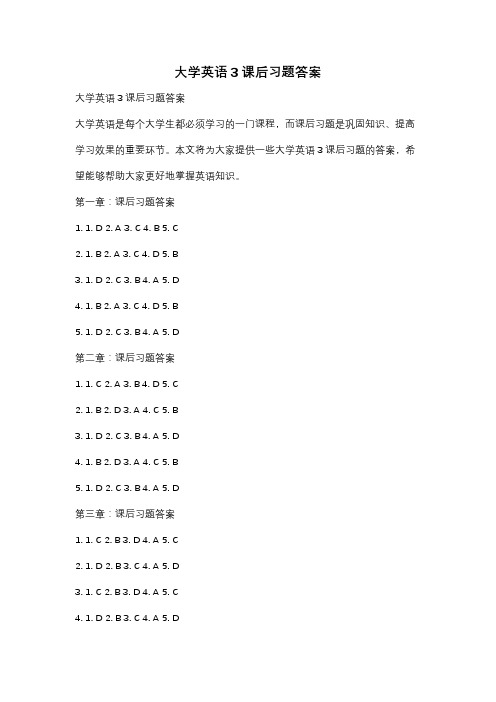
大学英语3课后习题答案大学英语3课后习题答案大学英语是每个大学生都必须学习的一门课程,而课后习题是巩固知识、提高学习效果的重要环节。
本文将为大家提供一些大学英语3课后习题的答案,希望能够帮助大家更好地掌握英语知识。
第一章:课后习题答案1. 1. D2. A3. C4. B5. C2. 1. B 2. A3. C4. D5. B3. 1. D 2. C 3. B4. A5. D4. 1. B 2. A 3. C 4. D5. B5. 1. D 2. C 3. B 4. A 5. D第二章:课后习题答案1. 1. C2. A3. B4. D5. C2. 1. B 2. D3. A4. C5. B3. 1. D 2. C 3. B4. A5. D4. 1. B 2. D 3. A 4. C5. B5. 1. D 2. C 3. B 4. A 5. D第三章:课后习题答案1. 1. C2. B3. D4. A5. C2. 1. D 2. B3. C4. A5. D3. 1. C 2. B 3. D4. A5. C4. 1. D 2. B 3. C 4. A5. D5. 1. C 2. B 3. D 4. A 5. C第四章:课后习题答案1. 1. C2. A3. D4. B5. C2. 1. B 2. A3. D4. C5. B3. 1. C 2. A 3. D4. B5. C4. 1. B 2. A 3. D 4. C5. B5. 1. C 2. A 3. D 4. B 5. C第五章:课后习题答案1. 1. B2. D3. A4. C5. B2. 1. C 2. A3. D4. B5. C3. 1. B 2. D 3. A4. C5. B4. 1. C 2. A 3. D 4. B5. C5. 1. B 2. D 3. A 4. C 5. B以上是大学英语3课后习题的答案,希望对大家的学习有所帮助。
- 1、下载文档前请自行甄别文档内容的完整性,平台不提供额外的编辑、内容补充、找答案等附加服务。
- 2、"仅部分预览"的文档,不可在线预览部分如存在完整性等问题,可反馈申请退款(可完整预览的文档不适用该条件!)。
- 3、如文档侵犯您的权益,请联系客服反馈,我们会尽快为您处理(人工客服工作时间:9:00-18:30)。
Unit 1 Personality(P14)Post Reading3 Reading Comprehension1. Understanding the Organization of the Text1) Introduction (Para. 1):Shyness is the cause of much unhappiness for a great many people.2) Reasons why shyness can have a negative effect (Para. 2-3) People's self-concept has a profound effect on all areas of their lives. People with high self-esteem usually act with confidence.People with low self-esteem are likely to be passive and easily influenced byothers.i) Recognize your personal strengths and weaknesses.ii) Set reasonable goals.iii) Don't waste time and energy on destructive feelings such as guilt andshame.iv) Don't be afraid to speak up and give your point of view.vi) Accept criticism thoughtfully.vii) Profit from failures and disappointments by viewing them aslearningexperiences.viii) Do no associate with people who make you feel inadequate.ix) Set aside time to relax, enjoy hobbies, and reevaluate your goalsregularly.1 / 20x) Practice being in social situations.4) Conclusion (Para. 16)2. Understanding Specific Information1) F 2) T 3) T 4) T 5) F 6) T 7) F 8) F 9) T3. (略)Vocabulary Practice1.”Self-”is a prefix which means ‘of, to or by oneself or itself.' Words with the prefix “self-”that appear in the text: self-conscious, self-concept, self-assurance, self-worth, self-confidence, self-esteem, self-destructive,self-awareness, self-acceptance, self-rejection, self-confident.1. self-conscious (worried and embarrassed about what you look like orwhat other people think of you)2. self-confidence (belief in one's own ability, power, judgment, etc.;confidence in oneself)3. self-esteem (the feeling that you are someone who deserves to be liked,respected, or admired)4. self-destructive (with thoughts or actions that are counter to one's ownbest interests)5. self-worth (the value you give to your life and achievements)6. self-concept (one's conception or general idea of one's own basiccharacter and nature)7. Self-awareness (realistic knowledge and judgment about oneself)8. self-assurance / self-confidence (the belief that you are able to deal withpeople and problems easily)2 / 202. 1) B 2) I 3) L 4) A 5) H6) D 7) E8) N 9) J 10) M 11) C 12) F 13)G 14) K11) detrimental12) isolated 13) self-esteem 14) accented4. 1) reflected 2) concerned / worried 3) profound effect / influence4) viewed / regarded 5) sensitive 6) respond / react Translation1. You should spend a reasonable amount of time relaxing and exercising.2. In general children are healthier and better educated than ever before.4. Every day he sets aside some time to be with his family and enjoy life.5. I remember those dark streets and walking hand in hand with my father.6. He finally failed to live up to his parents' expectations.7. In contrast, our use of oil has increased enormously.Part Four Writing and Translation(P 46)2. Translation PracticeFrom Chinese into English1) It is believed that pessimism often leads to hopelessness, sickness andfailure.2) Optimism, by contrast, can make you happy, healthy and successful.3) When you fail in something, profit from the failure as a learning experience.4) Think about your strengths and build up self-confidence in front ofproblems or difficulties.3 / 205) Don't let negative thoughts hold you back.6) Everyone has experienced failures and disappointments, so don't blameyourself too much.Unit 2 Myths and Legends(P60)Post Reading3 Reading Comprehension1. Testing Your Memory1) Because they were invited to a feast in the sky.2) He saw the birds were busy preparing.3) He planned to go to the feast / sky with the birds.4) They didn't agree because Tortoise was mischievous / cunning andungrateful.5) With a sweet tongue, he convinced the birds that he was a changed man.6) He made two wings with all the feathers he got from each bird.7) All of you.8) Nuts, meat and fish soup, pounded yam, yam soup, palm wine, etc.9) For whom have you prepared this feast?10) Because he knew the answer would be “For all of you”, which was his newname. So he could enjoy all the food first.11) They were very angry.12) They took back the feathers they had lent him.13) He asked them to take a message to his wife.4 / 2014) Parrot, because he wanted to take advantage of the chance to get revenge.15) He asked Parrot to tell his wife to bring out all the soft things in his houseand cover the ground with them so that he would be able to land safely. But Parrottold his wife to bring out all the hard and sharp things instead.16) His shell was broken into hundreds of pieces.2. Finding the Best SummarySample:3. Acting out the Story(略)4. Taking SidesSample:1) I don't admire Tortoise's cleverness. He was unwise to cheat all the birds.After his mischief, how could he have face to live together with them any longer? Hewould have no friends at all. He was clever, but at the same time he was also stupid .When all the birds became so angry, how could he have trusted Parrot? He shouldhave jumped into the sea to avoid being hurt.I sympathize with the birds. They took Tortoise out of kindness, but after flyingsuch a long distance, they had to fly back home on an empty stomach. They wereformally invited, but the food was eaten by Tortoise. I think the birds were veryunlucky.2) I learned from the story that a) we should be honest, and shouldn't cheatothers. If we cheat others, we will be punished in the end; b) we shouldn't be carriedaway by sweet words, like the birds; c) a leopard can't change its spots, nor canTortoise. He was cunning, he could never change his personality and behave himself.Vocabulary Practice1. 1) A. invitation B. invited C. inviting5 / 202) A. prepare B. prepared C. preparationD. preparatory / preparation3) A. discoveries B. discoverers C.discovered4) A. approval B. approve C. approved D. approvingE. disapprove5) A. eloquent B. eloquence C. eloquently6) A. faithful B. unfaithful/faithless C. faithD.faithfully7) A. occasional B. occasionally C. occasion8) A. delivery B. delivering C. delivered9) A. troublesome B. troubled C. troubled D. troubling10) A. assurance B. assured C. assure2. 1) got / ran into trouble 2) no trouble 3) asking for trouble4) have …trouble 5) trouble with 6) in serious/deep/big trouble7) get/getting …into trouble 8) took the trouble3. 1) with a pattern of roses2) prepared a wonderful / good meal for us3) promised faithfully4) deliver this letter5) a selection of milk and plain chocolate6) keep out of mischief / behave themselves7) the sound of distant thunder6 / 208) received approval from the government9) in spite of the fact that he drank too much10) agree whether the drug is safe or notPart Four Writing and Translation(P 96)2. Translation PracticeFrom English into Chinese万物之初,天地还是一体,充满混沌。
